
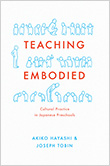 |
TEACHING EMBODIED: CULTURAL PRACTICE IN JAPANESE PRESCHOOLS
Akiko Hayashi, Joseph Tobin
Taking readers inside Japanese preschool classrooms, Teaching Embodied explores how teachers there act, think, and talk. Akiko Hayashi and Joseph Tobin embed themselves in the classrooms of three different teachers at three different schools. Drawing on extended interviews, their own real-time observations, and hours of video footage, they focus on how teachers embody their lessons: how they use their hands to gesture, comfort, or discipline; how they direct their posture, gaze, or physical location to indicate degrees of attention; and how they use the tone of their voice to communicate empathy, frustration, disapproval, or enthusiasm. Buy the book here. |
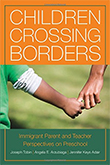 |
CHILDREN CROSSING BORDERS: IMMIGRANT PARENT AND TEACHER PERSPECTIVES ON PRESCHOOL
Joseph Tobin, Angela Arzubiaga, Jennifer Keys Adair
In many school districts in America, the majority of students in preschools are children of recent immigrants. For both immigrant families and educators, the changing composition of preschool classes presents new and sometimes divisive questions about educational instruction, cultural norms and academic priorities. Drawing from an innovative study of preschools across the nation, Children Crossing Borders provides the first systematic comparison of the beliefs and perspectives of immigrant parents and the preschool teachers to whom they entrust their children The study is distinctive in using a multi-sited approach, that shows that immigrant parents and their children’s preschool teachers have views on early childhood education that differ according to the affordances and constraints of their local communities. Buy the book here. |
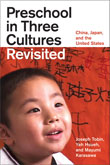 |
PRESCHOOL IN THREE CULTURES REVISITED
Joseph Tobin, Yeh Hsueh, Mayumi Karasawa, 2009
Joseph Tobin—along with new collaborators Yeh Hsueh and Mayumi Karasawa—revisits his original research to discover how two decades of globalization and sweeping social transformation have affected the way these three cultures educate and care for their youngest pupils. In Preschool in Three Cultures Revisited the authors return to the three schools featured in the first book and also take a look at three new, progressive schools in each country—once again armed with a video camera to capture a typical day. They record the children saying goodbye to their parents, fighting, misbehaving, and playing, as well as moments of intimacy such as teachers comforting crying students. Then the authors show the to the teachers and school directors, whose reactions provide insight into their culture’s approach to early childhood education. Putting their informants’ responses into social and historical perspective, Tobin, Hsueh, and Karasawa analyze the pressures put on schools to evolve and to stay the same, discuss how the teachers adapt to these demands, and examine the patterns and processes of continuity and change in each country. Buy the book here. Buy the companion video here. |
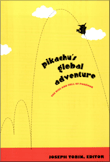 |
PIKACHU'S GLOBAL ADVENTURE: THE RISE AND FALL OF POKÉMON
Joseph Tobin, editor, 2004
This volume addresses core debates about the globalization of popular culture and about children’s consumption of mass-produced culture. Topics explored include the origins of Pokémon in Japanese cultural traditions of cuteness and anime, the efforts of Japanese producers and American marketers to localize it for foreign markets, and the contentious question of Pokémon’s educational value and place in school. Including teachers as well as scholars from the fields of anthropology, media studies, and sociology, the contributers track the reception of Pokémon in Japan, the United States, Great Britain, France, and Israel. Buy the book here. |
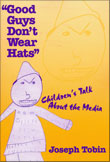 |
GOODGUYS DON'T WEAR HATS: CHILDREN TALK ABOUT MEDIA
Joseph Tobin, 2000
This book offers a fresh perspective on how children make sense of media representations of race, sex, violence, and class. By weaving poststructuralism, performance theory, and critical theory into his analysis, Tobin demonstrates how the meanings children give to media messages depend on the local contexts in which they live. Laced with the voices and perspectives of young children, who are wise, funny, and creative in their grasp of the media, Tobin challenges the convention that children are easily fooled by the media and suggests instead that they are capable of resistant interpretations of the movies and television they watch. Buy the book here. |
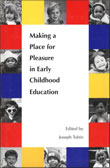 |
MAKING A PLACE FOR PLEASURE IN EARLY CHILDHOOD EDUCATION
Joseph Tobin, 1997
Kindergarten kissing games...four-year-olds playing doctor...a teacher holding a crying child on his lap as he comforts her. Interactions like these—spontaneous and pleasurable—are no longer encouraged in American early childhood classrooms, and in some cases they are forbidden. The quality of the lives of our children and their teachers is thereby diminished, contend the contributors to this timely book. In response to much-publicized incidents of child abuse by caretakers, a "moral panic" has swept over early childhood education. The contributors to this book explore how caretakers of preschool children and other adults have overreacted to fears about child abuse. Drawing on feminist, queer, and poststructural theories, the authors argue for the restoration of pleasure as a goal of early childhood education. Buy the book here. |
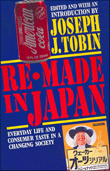 |
REMADE IN JAPAN
Joseph Tobin, editor, 1994
This book shows how in the process of domesticating foreign goods and customs, the Japanese have created a culture in which once-exotic practices (such as ballroom dancing) have become familiar, and once- familiar practices (such as public bathing) have become exotic.?Written by scholars from anthropology, sociology, and the humanities, the book ranges from analyses of Tokyo Disneyland and the Japanese passion for the Argentinean tango to discussions of Japanese haute couture and the search for an authentic nouvelle cuisine japonaise. These topics are approached from a variety of perspectives, with explorations of the interrelations of culture, ideology, and national identity and analyses of the roles that gender, class, generational, and regional differences play in the patterning of Japanese consumption. Buy the book here. |
 |
PRESCHOOL IN THREE CULTURES: JAPAN, CHINA, AND THE UNITED STATES
Joseph J. Tobin, David YH Wu, Dana H. Davidson, 1991
With growing numbers of mothers in the work force, industrialized societies are turning increasingly to preschools to educate, nurture, and socialize young children. This book presents a unique comparison of Japanese, Chinese, and American preschools and discusses how these schools both reflect and affect philosophies of child-rearing and early-childhood education and larger social patterns and beliefs in each society. Buy the book here. Buy the companion video here. |
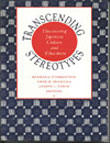 |
TRANSCENDING STEREOTYPES
Barbara Finkelstein, Anne E. Imamura, Joseph J. Tobin, editors, 1989
With growing numbers of mothers in the work force, industrialized societies are turning increasingly to preschools to educate, nurture, and socialize young children. This book presents a unique comparison of Japanese, Chinese, and American preschools and discusses how these schools both reflect and affect philosophies of child-rearing and early-childhood education and larger social patterns and beliefs in each society. Buy the book here. |